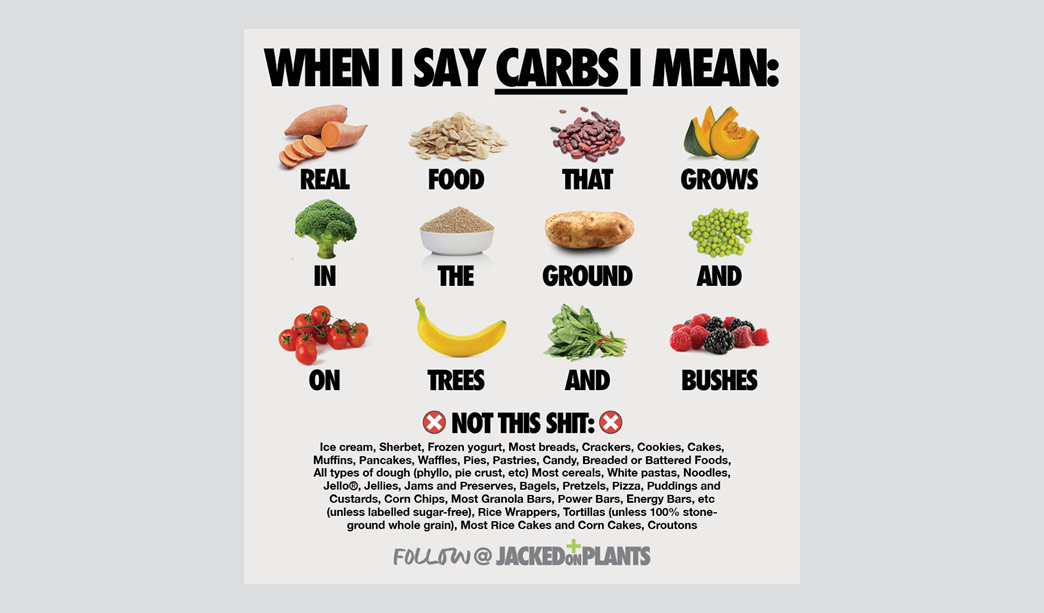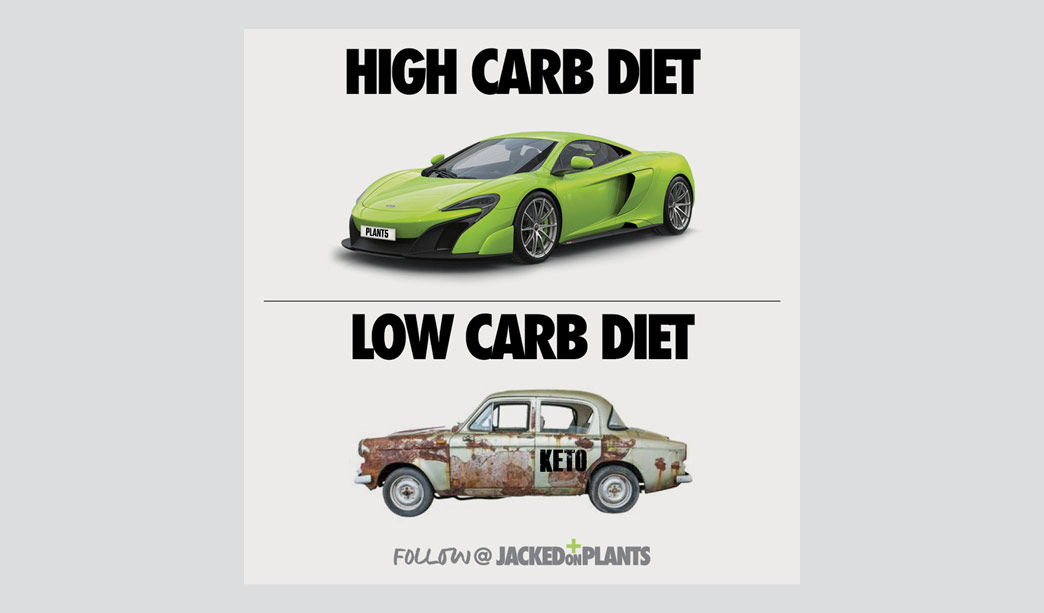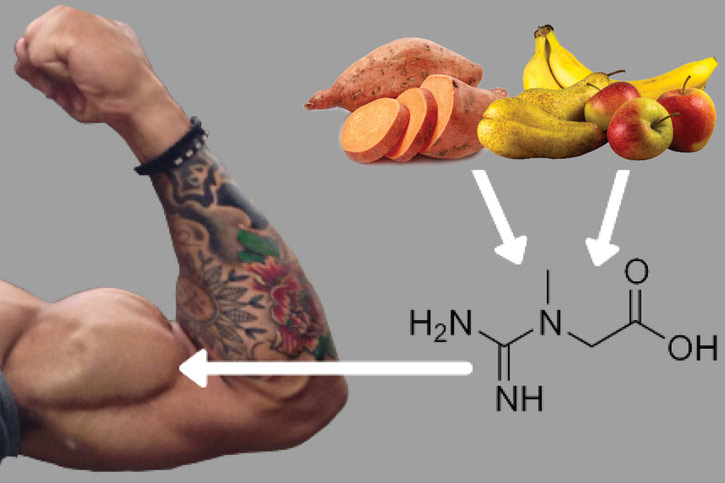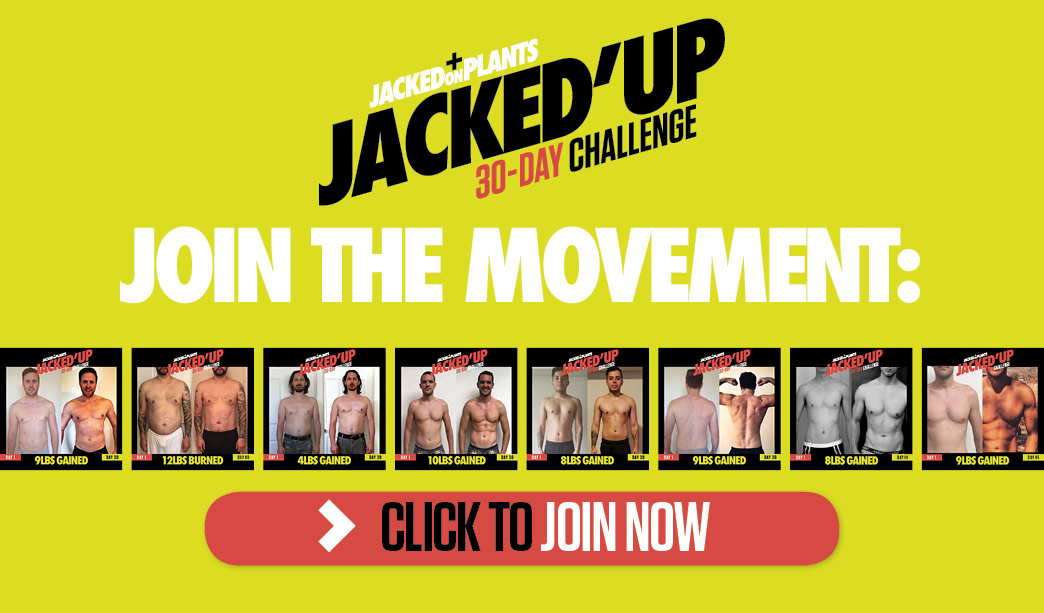Ask anyone what the key macro is for bodybuilding and I’ll bet the answer you get back…protein bro…
Just the word alone ‘CARBS’ is enough to strike fear into the hearts of the masses – weight gain, diabetes, raised insulin levels, heart disease and thoughts of general terror present themselves.
I’d been trying to build muscle my whole life and when I met an expert plant based trainer called Jay, who was able to explain the importance of a high carb diet when building muscle, everything changed.
Putting my focus on carbs (and the right carbs) enabled me to pack on 25 lbs of lean muscle mass in just over 11 weeks.
Carbs are the key to fast muscle, high energy, clear skin, faster recovery and much, much more. BUT they are also one of the most misunderstood food groups on the planet.

Let’s start with the confusion.
Carbs are found everywhere – bread, beans, milk, popcorn, potatoes, cookies, spaghetti, soft drinks, corn, and cherry pie. They also come in a variety of forms. The most common and abundant forms are sugars, fibers, and starches.
Oh MAN! Confused already?
- The healthiest sources of carbohydrates – unprocessed or minimally processed whole grains, vegetables, fruits and beans – promote good health (and gains) by delivering vitamins, minerals, fiber, and a host of important phytonutrients.CARBSC
- Unhealthier sources of carbohydrates – include white bread, pastries, sodas, and other highly processed or refined foods. These items contain easily digested carbohydrates that may contribute to weight gain, interfere with weight loss, and promote diabetes and heart disease.
In September 2002, the National Academies Institute of Medicine recommended that people focus on getting more good carbs with fiber into their diet. The following statements are based on information given in the report:
- To meet the body’s daily nutritional needs while minimizing risk for chronic disease, adults should get 45% to 65% of their calories from carbohydrates, 20% to 35% from fat, and 10% to 35% from protein.
- There is only one way to get fiber – eat plant foods. Plants such as fruits and vegetables are quality carbohydrates that are loaded with fiber. Studies show an increased risk for heart disease with low-fiber diets. There is also some evidence to suggest that fiber in the diet may also help to prevent colon cancer and promote weight control.
So the benefits of eating healthy carbs are crystal clear.
BUT WHAT ABOUT GETTING JACKED DUDE!? That’s what I’m here for!
KK – I got ya bro, don’t worry 🙂
ANABOLIC CARBS Eating carbs results in a spike in insulin (don’t panic), which has been shown to be more anabolic (muscle building) than testosterone itself

Insulin counteracts any kind of catabolic (muscle wasting) hormones.
Insulin also increases your metabolism to burn more overall calories.
Carbs when digested into your system turn into glycogen which is basically energy for your muscles and your brain.
So let’s sit back and forget all the things you have been told about the horrors of ‘Carbs’ and look at the facts when it comes to building muscle.
In CARBS we have a substance which helps increase hormones that are better than testosterone, stops hormones that waste away muscle, increases your metabolism and gives energy to muscles to work harder in the gym. Why again do we restrict this amazing macronutrient?
A high-carb diet can produce quick energy for physical exertion, at least in the short term. Carbohydrates metabolize quickly, providing the body’s main source of fuel, which is why athletes often eat high-carb foods in preparation for an event. Ask yourself – when you hit the gym – are you there as an athlete trying to bust out PBs and beast mode your workouts – or are you just some dude on a diet going through the motions?
I know the answer, don’t worry 🙂
For active individuals who work out hard and participate in things like weight lifting, running, or CrossFit, a low-fat/high-carbohydrate diet can greatly enhance their athletic performance and recovery from exercise.
Let’s dig in further to this powerful macronutrient.
Let’s say you decide to go low-carb while continuing to lift heavy in the gym. Your typical workout consists of 4 lifts, and you’re doing three sets of 8 at 80% of your 1 rep max. Basically, these are hard training sessions.
Your first workout while eating low-carb will actually go pretty well. Why? Because weight lifting largely utilizes anaerobic glycolysis to produce power and you likely have a lot of stored glycogen in your muscles from before you started stripping the carbs from your diet.
So you think to yourself “Man, low-carb is awesome! I’m going to lose weight, and my performance still feels great!”
But by the end of the training session, you’ve used up a good chunk of that stored muscle glycogen. Not all of it, but a decent amount.
You have a rest day on Tuesday and eat very few carbs. Glycogen stores weren’t replenished that much.
Back to the gym on Wednesday. The first set of squats feels good, but that’s because you were likely using stored ATP and creatine phosphate in your muscles for your energy. The second set feels a bit heavier, but not terrible. You’re now using anaerobic glycolysis.
The third set feels even harder because you’re using up more of your depleted reserves of stored glycogen.
By the end of the workout, you feel drained.
You rest on Thursday and continue to eat very few carbs.
Glycogen stores depleted even further.
You come back to the gym on Friday. First rep on your squats feels okay. Again, you’re just using stored ATP and creatine phosphate for that one.
The second rep feels like you’re going to die, but you finish it. Same with your third rep. You manage to complete the set, but feel completely drained. You’ve likely reached the dregs of your stored glycogen.
You start the second set of squats and go down to the bottom. You stay at the bottom of the squat. Like a sunken ship, you just don’t have the beans (literally) to lift the weight back up.
Because you’re taking part in an anaerobic activity, your body needs glucose to create the ATP it needs. But because you’ve been eating low-carb, your body doesn’t have a supply of glucose to replenish your ATP.
So you reduce the weight on the bar so you can finish your workout.
You feel like garbage at the end.
You continue to eat low-carb through the weekend. Consequently, glycogen stores are hardly replenished.
You hit the gym again on Monday. The first rep of the prescribed weight feels really heavy. You realize this is going to be another terrible workout. And it is. You are seriously under carbed.
This is not how athletes fuel their performance.
You speak to your low carb coach guru and he suggests a low rep range to counter your lack of staying power.
“Just lift real heavy man – that’s how you get big dude”
The problem with low-rep training is that it’s hard to get stronger with low reps as you become more and more advanced in your training.
You’ll need volume to do that. And to be able to complete the volume necessary for adaptation, you’ll be back to needing carbs.
Bottom line: To get stronger, and be able to push yourself in the gym, a diet high in carbs is absolutely critical.
WAIT; IT DOESN’T END THERE: The 4 Big Advantages of a High-Carb Muscle Building Diet:
1. Recovery
Not only do carbohydrates improve your ability to perform athletically, they also improve what is arguably the even more important part of the training equation: recovery.
It’s in recovery, not in the gym, when you actually get bigger, stronger, and faster. Carbs aid your recovery in two ways: increasing insulin production and increasing testosterone production.
- Insulin Production for Recovery (AND Muscle Gain)
Many low-carb fans argue that carbs make you fat because they spike insulin levels which directs glucose into fat cells.
Yes, carbohydrates cause insulin to spike, but no, insulin itself does not cause fat cells to get bigger (that happens if you’ve got excess calories – composed of any kind of macronutrient – in your system).
But you know what insulin itself does cause to get bigger?
Muscle cells.
When insulin binds to receptors in your muscle cells, it signals to their ribosomes to start making more protein, which is then turned into muscle tissues. In the absence of insulin, this muscle building process doesn’t happen. So if you want BIGGER muscles, you need insulin.
Besides kicking off protein-muscle synthesis, insulin helps inhibit the breakdown of muscle tissue.
Whenever you exercise, your body goes catabolic – meaning that it starts breaking down nutrients and tissues to fuel itself, even muscle tissue.
Insulin helps to ensure you break down less muscle during these periods.
Finally, insulin is the hormone that shuttles certain amino acids into your cells so that the tears you create in your muscle tissues while lifting can be repaired, and so you can get bigger and stronger.
Insulin isn’t the bad dude he’s been made out to be – Insulin is your favourite gym buddy. And there’s nothing like carbs to stimulate that critical insulin release. CARB UP!!!!
2. Testosterone Production
Besides providing the fuel your muscles need for long, hard workouts, carbohydrates also play an important role in testosterone production.
Several studies have shown that when individuals go on a low-carb diet, testosterone levels go down, while cortisol levels go up.
This is a hormonal recipe for muscle catabolism and decreased performance. This testosterone drop becomes especially pronounced when you’re engaging in high-intensity workouts.
On the other side of the fence, when you eat a high carb diet, your testosterone stays at optimal levels.
If you feel absolutely bushed and drained for the whole day after your workout, and wake up surprisingly sore and fatigued, you’re probably not getting enough carbohydrates in your diet.
Adding more carbs to your diet can be an absolute game-changer in your recovery, and get you feeling much less tired and much more energetic.
JACK your recovery my brother – CARB UP.
Personally, I LOVE the idea — both literally and symbolically — of taking in a lot of energy and burning up that energy, day in and day out. Wouldn’t you rather live a high-octane life, than to run on reserve battery-power that functions fine only because you remain anchored to a stationary dock?
Even if you’re just an amateur athlete, be an athlete man!
Perform your best. Push yourself. Be a beast. Keep the fire ever stoked, and ever burning hot. That’s what JACKED’UP means. Fueled with PREMIUM FUEL.
3. Psychological Effects – brain power
According to an Australian study published in the “Archives of Internal Medicine” in 2009, a high-carb diet may have psychological effects.
A lack of carbohydrates in the diet can lead to a reduction in the brain chemical serotonin, which can cause depression. Eating a diet high in carbs can restore serotonin levels, thus promoting a feeling of well-being.
4. Carbs are good for your heart
Research suggests that increasing your soluble-fiber intake (a type of fiber found in carb-rich foods like oatmeal and beans) by 5 to 10 grams each day could result in a 5 percent drop in “bad” LDL cholesterol.
Similarly, people who eat more whole grains (think brown rice, bulgur, quinoa) also tend to have lower LDL cholesterol and higher “good” HDL cholesterol.
Here’s the simple truth: There are many high-carbohydrate foods beneficial to both your health and athletic performance and if you’re a guy looking to jack up your muscles fast then they are absolutely critical to your progress.
The industry pushes the protein subject hard but the truth is most whole food plant based carbs contain high quality proteins, and when combined in a balanced carb rich diet you also benefit from a full amino acid profile that is more bioavailable than animal protein.
So if you’re eating a high calorie muscle gaining diet loaded with healthy carbs, you’ll smash your protein targets without having to rely on expensive processed powders that mostly just give you expensive pee.
The key is choosing the right carbs.
If you have any questions drop them in the comments below.
If you’re looking for custom built program to get jacked on plants fast, you’re in luck. I’ve built an easy to follow blueprint that takes you through the optimal nutrition plan and workout plan – basically a carbon copy guide of exactly how I went from 152 lbs to 176 lbs in just 11 weeks – eating only plants.
It’s a 30 day challenge that’s helping thousands of men, not only reach their body goals faster than they ever thought possible – it’s changing their entire lives and health.
Join the Movement!


